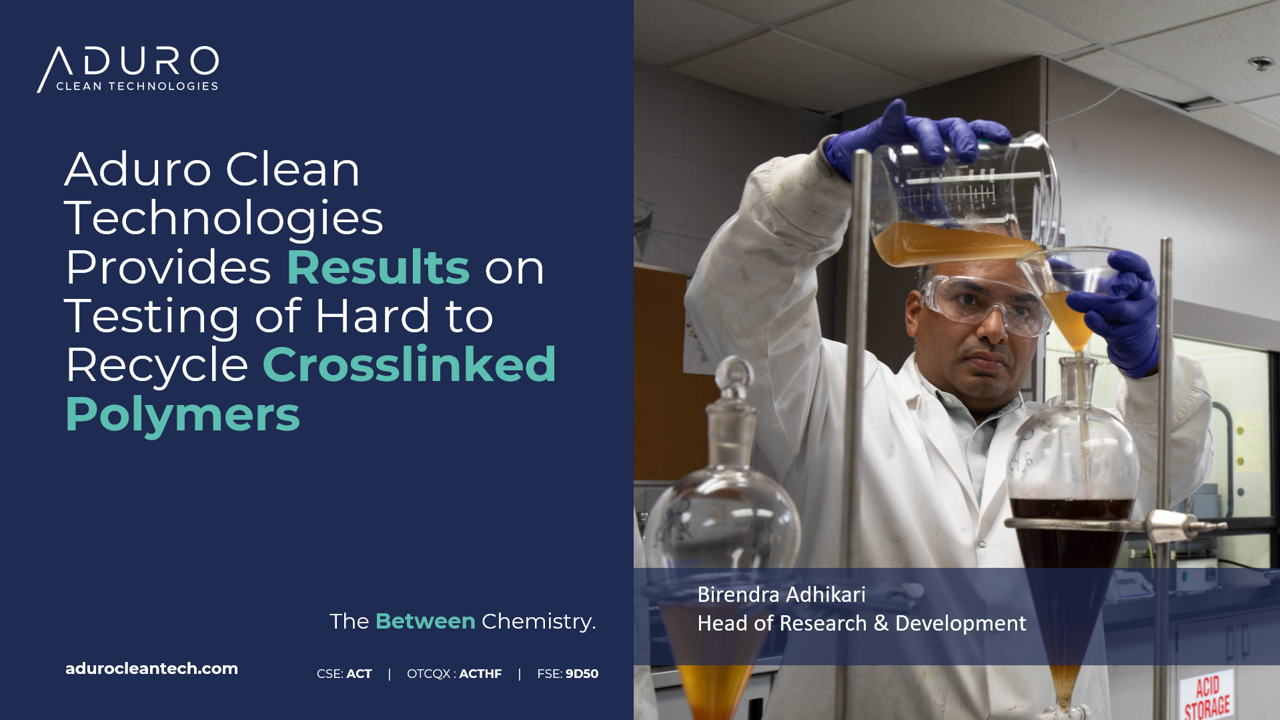Aduro Clean Technologies Provides Results on Testing of Hard to Recycle Crosslinked Polymers
Aduro Clean Technologies (CSE: ACT, OTCQX: ACTHF) has announced promising results from using its Hydrochemolytic™ Technology to deconstruct crosslinked polymers, such as crosslinked polyethylene (XLPE). The company achieved up to 84% yield of lower-molecular-weight hydrocarbons from XLPE waste, demonstrating the technology's effectiveness in recycling difficult materials. This breakthrough not only supports the building materials sector but also opens doors to markets for recycling crosslinked polymers. Aduro is also exploring applications in tire rubber and elastomeric materials, showcasing the versatility of its technology.
- Aduro achieved up to 84% yield of lower-molecular-weight hydrocarbons from XLPE.
- Hydrochemolytic™ Technology successfully deconstructs hard-to-recycle crosslinked polymers.
- The technology provides a customizable solution tailored to industry-specific requirements.
- Potential to open doors to large markets for crosslinked polymers recycling.
- Engagements with potential clients in the tire rubber and elastomeric sectors are ongoing.
- The press release does not detail the cost or scalability of the technology.
- Commercial viability and long-term sustainability of the technology are yet to be proven.
- Potential regulatory challenges and market acceptance hurdles are not addressed.
LONDON, Ontario, May 16, 2024 (GLOBE NEWSWIRE) -- Aduro Clean Technologies Inc. (“Aduro” or the “Company”) (CSE: ACT) (OTCQX: ACTHF) (FSE: 9D50), a Canadian technology company using the power of chemistry to transform lower value feedstocks, like waste plastics, heavy bitumen, and renewable oils, into resources for the 21st century, is pleased to share exciting results from preliminary tests achieved with deconstructing crosslinked polymers, using the Company’s Hydrochemolytic™ Technology.
Crosslinked polymers are pivotal to numerous industries, thanks to their exceptional durability, chemical resistance, and mechanical strength. They are integral to many products ranging from automotive tires to household adhesives, protective coatings, and medical devices. Their critical applications span sectors such as aerospace, automotive, construction, and electronics, where their unique properties are indispensable. Roughly 2.5 million metric tons of XLPE is produced annually representing a
However, the same characteristics that make crosslinked polymers so valuable also create significant recycling challenges. Unlike thermoplastics, these materials do not melt under heat, making them difficult to recycle by traditional technologies. High-temperature technology processes typically result in char and fuel gas, which are unsuitable for repurposing into new materials. This challenge underscores the pressing need for innovation in chemical recycling technologies.
On March 27th, 2024, Aduro announced it engaged with a building materials manufacturing company to investigate the fate of crosslinked polymers under Hydrochemolytic™ conditions. The client provided a sample of crosslinked polyethylene (XLPE), a waste stream from its local production facilities, on which Aduro investigated the application of its proprietary technology for chemical recycling of this difficult-to-recycle material.
Aduro is excited to report promising results from the preliminary tests with yields up to
This work not only solidifies the Aduro pathway into the building materials sector, but also opens the door to very sizeable markets for crosslinked polymers to be recycled. Now Aduro considers tire rubber and elastomeric materials as additional potential feedstock to demonstrate the versatility of HCT in chemical recycling of polymeric materials. Accordingly, the Company is actively engaged in discussions with potential engagements in these sectors.
“This milestone confirms our preliminary assessment that we can provide customizable solutions tailored to industry specific requirements. We were able to transform XLPE waste into high-quality liquid hydrocarbons, with an impressive conversion yield, enhancing the material's lifecycle and providing a reliable feedstock for refineries. This development addresses a critical challenge in the industry and opens new avenues for sustainable material management,” commented Eric Appelman Chief Revenue Officer at Aduro.
“We established our customer engagement program to work directly with our clients to investigate and develop solutions for their specific needs,” commented Ofer Vicus, Chief Executive Officer at Aduro. “The results from the crosslinked polymer tests are very exciting. It is another example of the ability of HCT to deconstruct and create value from hard to recycle materials which have proven to be challenging for traditional approaches.”
About Aduro Clean Technologies
Aduro Clean Technologies is a developer of patented water-based technologies to chemically recycle waste plastics; convert heavy crude and bitumen into lighter, more valuable oil; and transform renewable oils into higher-value fuels or renewable chemicals. The Company’s Hydrochemolytic™ technology relies on water as a critical agent in a chemistry platform that operates at relatively low temperatures and cost, a game-changing approach that converts low-value feedstocks into resources for the 21st century.
For further information, please contact:
Ofer Vicus, CEO
ovicus@adurocleantech.com
Abe Dyck, Investor Relations
ir@adurocleantech.com
+1 226 784 8889
Arrowhead
Thomas Renaud, Managing Director
enquire@arrowheadbid.com
+1 212 619 6889
Forward-Looking Statements
This news release contains forward-looking statements. All statements, other than statements of historical fact that address activities, events, or developments that the Company believes, expects, or anticipates will or may occur in the future, are forward-looking statements. The forward-looking statements reflect management’s current expectations based on information currently available and are subject to a number of risks and uncertainties that may cause outcomes to differ materially from those discussed in the forward-looking statements. Although the Company believes that the assumptions inherent in the forward-looking statements are reasonable, forward-looking statements are not guarantees of future performance, and, accordingly, undue reliance should not be put on such statements due to their inherent uncertainty. Important factors that could cause actual results to differ materially from the Company’s expectations include adverse market conditions and other factors beyond the control of the parties. The Company expressly disclaims any intention or obligation to update or revise any forward-looking statements whether because of new information, future events, or otherwise, except as required by applicable law.
The CSE has not reviewed, approved, or disapproved the content of this news release.

A photo accompanying this announcement is available at https://www.globenewswire.com/NewsRoom/AttachmentNg/5fd5506d-7bf8-4209-892d-b758182119c3

FAQ
What is the stock symbol for Aduro Clean Technologies?
What technology did Aduro use to deconstruct crosslinked polymers?
What were the yields from Aduro's testing of crosslinked polymers?
What is the potential market size for crosslinked polymers recycling?







